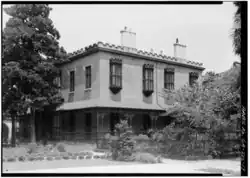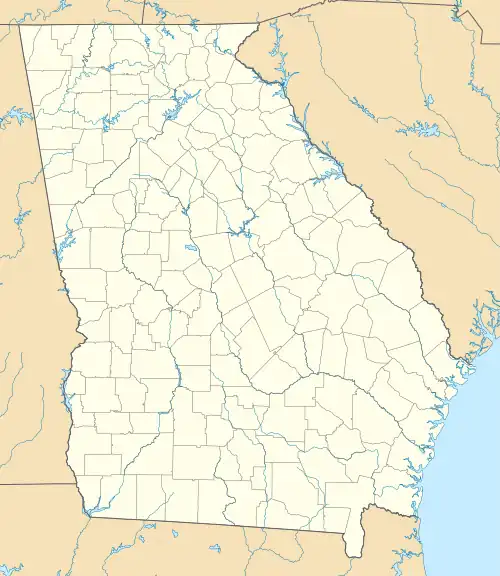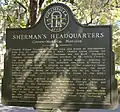Green–Meldrim House
The Green–Meldrim House is a historic house at 14 West Macon Street, on the northwest corner of Madison Square, in Savannah, Georgia.[3][4] Built in 1853,[5] it was designated as a National Historic Landmark in 1976 as one of the American South's finest and most lavish examples of Gothic Revival architecture.[6][7] The house is owned by the adjacent St. John's Episcopal Church, which offers tours and uses it as a meeting and reception space.
Green–Meldrim House | |
 Green–Meldrim House in the mid-20th century | |
  | |
| Location | Madison Square, Savannah, Georgia |
|---|---|
| Coordinates | 32°4′26″N 81°5′41″W |
| Built | 1853 |
| Architect | John S. Norris |
| Architectural style | Gothic Revival |
| Part of | Savannah Historic District (Savannah, Georgia) (ID66000277) |
| NRHP reference No. | 74000664 |
| Significant dates | |
| Added to NRHP | January 21, 1974[1] |
| Designated NHL | May 11, 1976[2] |
Description
The Green–Meldrim House is located on the west side of Madison Square in central Savannah, at the southwest corner of West Harris and Bull Streets. West Macon Street, the house's address, is a spur street off Whitaker Street, which runs behind the property. The house's principal facade faces south, with a porch and garden facing the square. The house is among the best-known examples of the Gothic Revival style in the South, with a stuccoed brick exterior, cast-iron porch, oriel windows, and an imposing front cast-iron fence. The main entrance has an iron portico believed to be unique in the United States, with octagonal posts supported a pair of arches. A crenellated parapet rings the roof. The interior of the house, following a center-hall plan, retains original woodwork, plaster, and ironwork, the latter featuring a freestanding staircase.[8]
History

The house was designed and built in 1853 at a cost of $93,000 by the architect John Norris.[9][10] The property's first owner was Charles Green, a wealthy cotton merchant and grandfather of the writer Julien Green.[11]
After the Union troops captured Savannah in 1864, Gen. Sherman occupied the house and used it as a headquarters until the end of the Civil War.[12] It was in this house in December 1864 that Sherman composed his famous telegram to President Lincoln, in which he communicated his desire to present to the President "as a Christmas Gift the City of Savannah, with one hundred and fifty heavy guns and plenty of ammunition, and also about twenty-five thousand bales of cotton"; the cotton belonged to Charles Green, the owner of the House.[13][14] On January 12, 1865 Sherman and Secretary of War Edwin Stanton met with 20 Black Baptist and Methodist ministers—including Garrison Frazier, Ulysses L. Houston, and William Gaines—in what would later be called the "Savannah Colloquy" at the house. Their discussion directly led to Sherman's Special Field Orders No. 15, which included the famous Forty acres and a mule land allotment.[15]
In 1892, local politician and judge Peter Meldrim purchased the property and lived in it a number of decades.[16] In 1943, his heirs sold the house to St John's Church, which is located next door. In the 1950s, Savannah Landscape Architect Clermont Huger Lee provided period appropriate designs and planting plans for the garden.[17] Tours of the house are given during the day, and the church uses it for wedding receptions and after-church events.[18] At this time, none of the original furniture is on display at the house.
Photos
 Green–Meldrim house in 2011
Green–Meldrim house in 2011 The library of the Green–Meldrim House
The library of the Green–Meldrim House Side view
Side view Historical marker
Historical marker
See also
References
- "National Register Information System". National Register of Historic Places. National Park Service. January 23, 2007.
- "Green–Meldrim House". National Historic Landmark summary listing. National Park Service. Archived from the original on January 31, 2009. Retrieved June 21, 2008.
- "Madison Square". Savannah’s City Council. Archived from the original on October 25, 2007. Retrieved April 14, 2015.
- "Madison Square". visit-historic-savannah.com. Archived from the original on April 14, 2015. Retrieved April 14, 2015.
- Historic Building Map: Savannah Historic District – Historic Preservation Department of the Chatham County-Savannah Metropolitan Planning Commission (November 17, 2011), p. 49
- "Lists of National Historic Landmarks". National Park Service.
- "National Historic Landmarks Program (NHL)". Archived from the original on January 31, 2009. Retrieved June 21, 2008.
- "NHL nomination for Green–Meldrim House". National Park Service. Retrieved December 22, 2015.
- "Norris, John S. (1804–1876)". ncsu.edu. Retrieved April 14, 2015.
- "John Norris (1804–1876)". New Georgia Encyclopedia. Retrieved April 14, 2015.
- "Julien Green (1900–1998)". New Georgia Encyclopedia. Archived from the original on April 8, 2013. Retrieved April 14, 2015.
- "Green–Meldrim House". visit-historic-savannah.com. Retrieved April 14, 2015.
- National Archives and Records Administration (November 16, 2010). "Prologue: Pieces of History". archives.gov. Retrieved April 14, 2015.
- "History | St. John's Episcopal Church". Archived from the original on October 2, 2011. Retrieved August 23, 2011.
- Lawton, Laura (2015). Legendary Locals of Savannah. Arcadia Publishing. p. 62. ISBN 9781467101981.
- Polk's Savannah City Directories
- Dolder, Ced (Spring 2014). "Clermont Lee, (1914–2006) Pioneering Savannah Landscape Architect" (PDF). Magnolia – Publication of the Southern Garden History Society. XXVII (2): 4. Retrieved February 16, 2020.
- "Green–Meldrim House". St. John's Church Savannah GA. Retrieved April 14, 2015.
External links
- The History of the Green–Meldrim House
- Images of the Green–Meldrim House I
- Sherman's Headquarters historical marker at Digital Library of Georgia